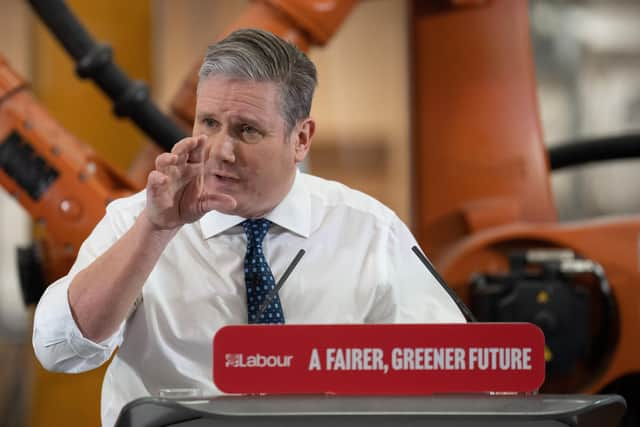Net zero's incompatibility with levelling up is a dilemma for Labour's Keir Starmer - Bill Carmichael
This was an easy way to win plaudits from environmentalists and Just Stop Oil activists, but Sir Keir had little time to bask in their praise before being knocked off his feet by a wave of fierce criticism.
According to the BBC, the move prompted fury among the trade unions with one union boss, Gary Smith of the GMB, saying the policy was “naive” and would create a “cliff-edge for jobs”.
Advertisement
Hide AdAdvertisement
Hide AdMr Smith told his union’s annual conference in Brighton that “our future requires a mix of energy sources”, including oil and gas.


He added: “It would be a huge mistake to put all the nation’s eggs in one energy basket.”
Rishi Sunak was quick to take advantage of the disarray in Labour’s ranks, accusing Sir Keir of allowing “eco-zealots” from Just Stop Oil to dictate his party’s energy policy.
Speaking to reporters in Washington DC before a meeting with US President Joe Biden, the Prime Minister said: “It is a completely bizarre policy which says, ‘we won’t ban oil and gas; we will just ban British oil and gas’.
Advertisement
Hide AdAdvertisement
Hide Ad“The only people who benefit from Keir Starmer’s energy policy are dictators and autocrats like Vladimir Putin.”
Sir Keir was forced to smooth the ruffled feathers of his union paymasters, later promising to protect communities threatened by job losses in the oil and gas industries, and avoid the “devastation” that hit coal mining communities in Yorkshire and elsewhere when that industry came to an end.
The government has set a target to reach net zero emissions by 2050.
Labour says it should be achieved 20 years earlier in 2030. Are either of these targets realistic?
Advertisement
Hide AdAdvertisement
Hide AdIn one way it doesn’t matter because even if the target is reached it won’t make much difference to the overall health of the planet.
That’s because net zero, as currently constituted, is a massive con. It is not about reducing carbon emissions by very much, but simply moving them elsewhere.
What Western countries, including the UK, are doing is “offshoring” our carbon emissions. In practice that means we are closing heavy industry and manufacturing in our countries and moving production - and the associated jobs - to places like India and China.
This won’t do much to reduce overall global carbon emissions, and in some instances it will actually make things worse.
Advertisement
Hide AdAdvertisement
Hide AdFor example, a manufacturing plant in the UK will be powered to some degree by clean nuclear power, gas and renewables.
But if you move that factory to China it will more than likely be powered entirely by dirty coal.
Same goes for farming. Western governments are making it increasingly difficult for farmers to grow food.
For example in the Netherlands, the second largest food exporter in the world behind the United States, farmers are under sustained attack from their own government which wants to reduce livestock numbers by a third as part of a “green transition” in agriculture.
But again it is sleight of hand.
Advertisement
Hide AdAdvertisement
Hide AdIf we close farms in the West and instead buy our meat from cattle ranches built on newly stripped Amazonian rainforests, how is that helping the environment?
Furthermore, the idea of net zero seems incompatible with “levelling up”.
We should be creating those jobs in heavy industry and manufacturing in the North of England, not exporting them to the other side of the world.
If carbon is going to be emitted anyway, it is far better to emit it here, where our own people and communities can benefit from the employment opportunities it provides.
Advertisement
Hide AdAdvertisement
Hide AdIf we want to be honest with ourselves about carbon emissions we should be measuring it not on a per country basis, but on a per head basis.
In other words we should count the carbon cost of everything we consume, regardless of where in the world it is emitted.
That would be the transparent and responsible thing to do.
But there is not a cat in hell’s chance of any government doing that, because if they did there would absolutely no possibility of reaching net zero in 2030, 2050 or possibly even the year 2100.